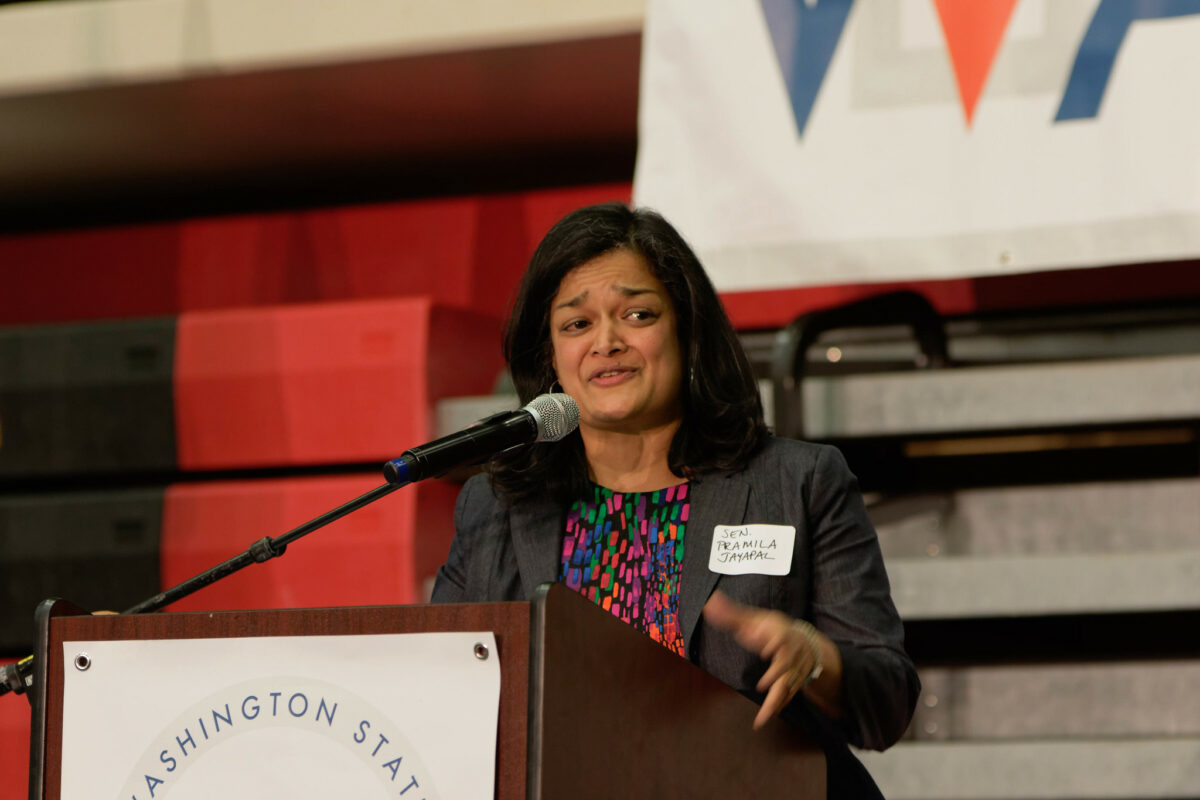Progressive leaders in Congress and activists on Wednesday came together to call on U.S. President Joe Biden to declare a climate emergency, which would give his administration more resources to take on the global crisis.
“It couldn’t be clearer that the climate crisis is here and needs to be addressed urgently,” said Congressional Progressive Caucus (CPC) Chair Pramila Jayapal (D-Wash.), who kicked off the event a day her district endured extreme heat.
“We, together, are calling on President Biden to use his executive power to declare a climate emergency,” she said. “Movements, activists, scientists, and young people have long called for the United States to recognize climate change as the emergency that it is.”
Jayapal was joined by several CPC members—Democratic Reps. Jamaal Bowman (N.Y.), Jared Huffman (Calif.), Ro Khanna (Calif.), Melanie Stansbury (N.M.), Rashida Tlaib (Mich.), and Bonnie Watson Coleman (N.J.)—along with John Beard of Port Arthur Community Action Network, Ashley Engle of Ikiya Collective, John Paul Mejia of Sunrise Movement, Keya Chatterjee of U.S. Climate Action Network, and Jean Su of Center for Biological Diversity.
I just left a press conference with my @USProgressives colleagues. We're calling for @POTUS to declare a climate emergency, which will unleash billions of dollars that we can invest in renewable energy.
We must keep fighting. This is our generational challenge. pic.twitter.com/BjEbxmh40b
— Rep. Ro Khanna (@RepRoKhanna) July 27, 2022
Multiple speakers, including Khanna and Su, highlighted what the administration could do if Biden made such a declaration—which Su’s group also detailed in a February report that urged the president to halt crude oil exports; stop drilling in the outer continental shelf; restrict international trade and private investment in fossil fuels; grow domestic manufacturing for clean energy and transportation; and build resilient and distributed renewable energy systems in climate-vulnerable communities.
“What the hell are we waiting for?” Bowman asked Wednesday. “We have to get something done like yesterday. The president must declare a climate emergency and mobilize every resource we have to respond to it.”
Biden last week delivered an address on climate at a shuttered coal plant—and even said that “Congress is not acting as it should” and “this is an emergency.” However, he declined to issue a formal declaration.
“We are in a crisis of tipping points, and frontline and BIPOC communities are losing their lives and livelihoods while Biden dithers,” JL Andrepont, senior policy campaigner and policy analyst at 350.org, said after the speech.
Campaigners and lawmakers were similarly critical on Wednesday.
"My residents don't have another day, another time, another year. They just don't … Why isn't anyone asking how we pay for the fossil fuel subsidies? … When are we going to wake up and understand that it's this time and moment that we have to act?" @RepRashida pic.twitter.com/BedgllFuhG
— Center for Climate Integrity (@climatecosts) July 27, 2022
“People from frontline communities like mine are dying right now,” said Engle, an Oklahoman. “Your presidential legacy will be determined by the biggest threat this nation has ever faced, apart from the ongoing colonization of Indigenous lands. This is a climate emergency. And, Joe Biden, we are calling on you to stop wavering, to stop playing with our lives, and act accordingly.”
Mejia, who recently turned 20, talked about coming of age in southern Florida, fearful of increasingly dangerous hurricanes. He also noted the young voters who came out to support Biden in the 2020 presidential election—and the young congressional staffers who on Monday “risked their careers” by holding a sit-in to demand climate action at the Capitol Hill office of Senate Majority Leader Chuck Schumer (D-N.Y.), a protest that ended with some arrests.
“It’s time for President Biden to act alongside us and treat the climate crisis like the emergency that it is,” said Mejia, “because frankly, our communities, and our generation, cannot withstand another could-have-been climate president.”
“On that note, President Biden has a choice to make,” he continued. “Will he side with millions of Americans and millions of young people and declare a climate emergency, and take the executive action needed to combat this crisis? Or will he fold to a handful of fossil fuel executives and condemn my generation to a brutally warming world?”
“We are living through a climate catastrophe. It is clear, everyone knows it. We see the result of it each and every day.” @RepBowman today with @StopBigOil calling on @POTUS to declare a climate emergency NOW.
“If we do not have a planet we do not have anything.” pic.twitter.com/ci5kYoirQy
— Cass DiPaola (@CassDiPaola) July 27, 2022
Along with echoing the calls of other activists for an emergency declaration, Chatterjee said that “we also need to take on the bad guys,” urging Biden to stand up to fossil fuel companies in part by not allowing any more leases to extract oil and gas from public lands and waters.
While the press conference largely focused on Biden, Stansbury acknowledged that “it’s not just up to the president.”
“It’s up to us as well—right here, in this room, these members of Congress, and those guys sitting over there in the United States Senate, because it’s not just about the president using his administrative powers,” the lawmaker said. “We must pass reconciliation with a half-trillion-dollar investment in climate action.”
A couple of hours after the event began, Schumer and Sen. Joe Manchin (D-W.Va.)—who infamously blocked his own party’s watered-down reconciliation bill after it was approved by the House last year—announced Wednesday they had reached a deal on climate legislation.
